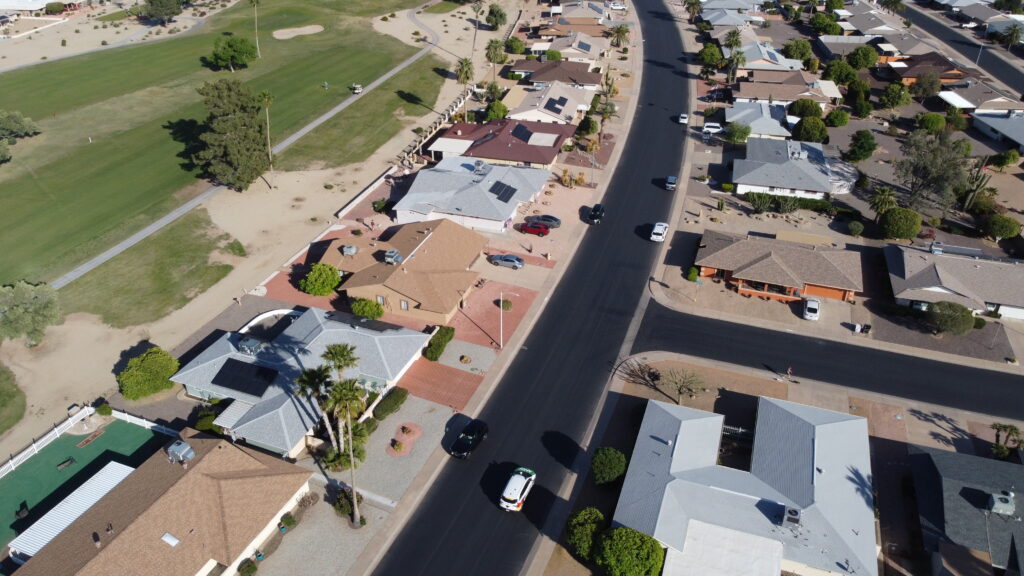
New May Mobility service rolls out in Arizona as coalition calls for expedited AV deployment
By onAnnouncements | Technology
Toyota-backed autonomous vehicle (AV) startup May Mobility says it will begin its early rider program on public roads this month in an Arizona retirement community.
A May Mobility spokesperson said the technology will require special considerations among collision repair professionals.
“In addition to the usual vehicle repairs, we also have repair considerations around the calibration of our sensors and cameras, checking that communications between the various components are healthy, and retesting our autonomy to ensure that it behaves as expected,” the spokesperson told Repairer Driven News.
May Mobility revealed Monday that it will initially deploy its driverless service in the retirement community Sun City, saying it “represents the first of many communities” where it plans to launch rider-only public transit services.
“May Mobility has built a more scalable autonomy solution at a fraction of the cost of other systems of a similar maturity,” said Anna Brunelle, the company’s chief financial officer. “And as we continue to expand and improve our driverless operational design domain, we step closer to our goal of being the first profitable AV company.”

According to May Mobility, the driverless vehicles leverage the company’s multi-policy decision-making (MPDM) technology that can handle unique challenges.
“MPDM continually runs real-time, on-board simulations to virtually imagine thousands of possible scenarios every second and enable a vehicle to decide for itself which action is the most safe,” the AV startup said. “These endless simulations lead to emergent behavior that allows a vehicle to instantly solve every problem imaginable — and then some.”
The driverless vehicles have been operating since April on Sun City’s public roads with a safety operator in the driver’s seat and will now transition to running daily throughout the week without an operator present, May Mobility said.
Its service will allow a “select group” of early riders to request a pickup in one of May Mobility’s Toyota Siennas. The service, which will initially be free, will be powered by TransitTEch company Via, May Mobility said.
In October, the California Department of Motor Vehicles (DMV) announced that it suspended the deployment and driverless testing permits of General Motors’ Cruise autonomous taxis, in part due to safety but also because it said Cruise “misrepresented” information related to the vehicles’ safety.
“Public safety remains the California DMV’s top priority, and the department’s autonomous vehicle regulations provide a framework to facilitate the safe testing and deployment of this technology on California public roads,” the department said in a press release. “When there is an unreasonable risk to public safety, the DMV can immediately suspend or revoke permits.”
The suspension came days after Cruise said it was working with local emergency responders and police to address concerns related to a collision between a robotaxi and a firetruck in August. Cruise also operates in Arizona.
May Mobility said that while it can’t speak to Cruise-related concerns, its system is designed with “layers of safety.”
“We have developed a safety case that is under independent third-party review to make sure safety objectives are met before deployment per our safety policy. The system is verified at multiple levels to make sure that we are operating as safely as possible,” its spokesman said.
“We prioritize safety first, and have taken a slower and more measured approach than many in our industry in part to allow the time to build a system we feel confident will operate safely.”
Meanwhile, more than a dozen organizations are calling on Transportation Secretary Pete Buttigieg to advance a proposed program that would expedite the deployment of self-driving cars.
In a letter sent to Buttigieg earlier this month, the coalition of trade groups urged him to bring forward a notice of proposed rulemaking on the Automated Driving System (ADS)-Equipped Vehicle Safety, Transparency and Evaluation Program (AV STEP).
Under AV STEP, the National Highway Transportation Safety Administration (NHTSA) would consider applications for deploying compliant and noncompliant ADS vehicles, with the latter subject to review.
In their letter, program advocates said the AV industry is at a “critical juncture” and requires strong leadership from the U.S. Department of Transportation.
“We urge the Department to use existing authorities to assert its jurisdiction over the design, construction, and performance of motor vehicles, including those deploying emerging technology,” the letter says. “AV STEP could hasten the deployment of vehicles whose designs require exemptions from the current Federal Motor Vehicle Safety Standards and introduce a new era of accessibility and vehicle safety for the American public.”
Images
All images courtesy of May Mobility
